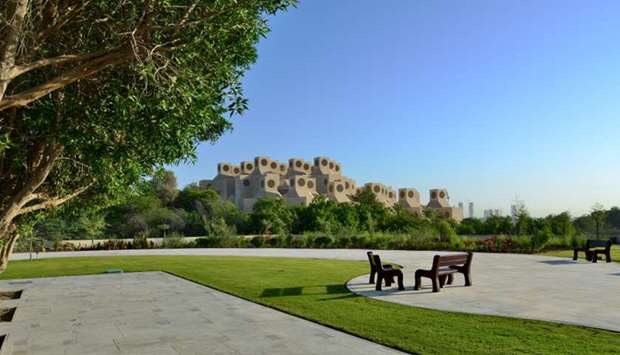In a collaborative effort, scientists from Qatar Biomedical Research Institute (QBRI) and Qatar University (QU) have been exploring the possibility of repurposing anti-tumour drugs for Covid-19 treatment.
“We started by performing a computer-based analysis of the proteins of the Sars-CoV-2 virus to explore which type of reactive metabolites would be most effective in producing proteotoxicity - damage to its proteins," said Dr Naila Rabbani of QU's College of Medicine.
Two reactive metabolites known to produce major quantitative modification of protein in physiological systems are: reactive oxygen species (ROS) and methylglyoxal (MG), she explained.
“We are in the midst of a pandemic, with time not being on our side, so repurposing an existing drug can help us find a cure much faster," said Prof Dr Paul J Thornalley, research director of the Diabetes Research Centre at QBRI, part of Hamad Bin Khalifa University.
"Because they are already approved drugs, the conditions for safe use are known which eliminates the need for lengthy safety evaluation,” he noted.
“Upon investigating the interaction of these metabolites with the Sars-Cov-2 virus, we found that the virus is likely resistant to ROS but sensitive to modification by MG on the spike protein and nucleoprotein. The spike protein is vital for virus entry into human lung cells whereas the nucleoprotein is responsible for virus replication; damaging these two would effectively result in impaired infectivity and replication,” said Prof Thornalley.
“Having established that a pharmacological increase of MG would produce a virucidal effect and therapeutic response, we identified two anti-tumour drugs which increase cellular MG concentration to virucidal levels: doxorubicin and paclitaxel. We are now performing further studies on these two drugs to confirm our predictions and determine the dosage and duration of treatment that would be required for the Sars-CoV-2 virus,” he said.
“Since these drugs are already in clinical use, we are aware of potential adverse effects. However, most of these adverse effects are linked to dose and duration of treatment. We know that the duration of treatment against Covid-19 will be much shorter than in cancer chemotherapy. A typical course of chemotherapy is at least six months or more whereas the maximum period of treatment of Covid-19 is about one month. We don’t know about the dose required yet, but if the dose is lower or similar to that used in cancer treatment then the drugs will likely have appropriate safety for use in Covid-19 treatment,” Dr Rabbani said.
“Our findings provide evidence of potential vulnerability of Sars-Cov-2 to inactivation by MG and a scientific rationale for repurposing of doxorubicin and paclitaxel for treatment of Covid-19 disease, providing efficacy and adequate therapeutic index may be established. We are currently following up on this research and evaluating the drugs – doxorubicin and paclitaxel – against Sars-CoV-2 live virus cultures at QU.”
Dr Rabbani is leading this collaborative project at QU funded by a QU Emergency Response Grant and the results of the on-going research are expected by end of this year.
Two reactive metabolites known to produce major quantitative modification of protein in physiological systems are: reactive oxygen species (ROS) and methylglyoxal (MG), she explained.
“We are in the midst of a pandemic, with time not being on our side, so repurposing an existing drug can help us find a cure much faster," said Prof Dr Paul J Thornalley, research director of the Diabetes Research Centre at QBRI, part of Hamad Bin Khalifa University.
"Because they are already approved drugs, the conditions for safe use are known which eliminates the need for lengthy safety evaluation,” he noted.
“Upon investigating the interaction of these metabolites with the Sars-Cov-2 virus, we found that the virus is likely resistant to ROS but sensitive to modification by MG on the spike protein and nucleoprotein. The spike protein is vital for virus entry into human lung cells whereas the nucleoprotein is responsible for virus replication; damaging these two would effectively result in impaired infectivity and replication,” said Prof Thornalley.
“Having established that a pharmacological increase of MG would produce a virucidal effect and therapeutic response, we identified two anti-tumour drugs which increase cellular MG concentration to virucidal levels: doxorubicin and paclitaxel. We are now performing further studies on these two drugs to confirm our predictions and determine the dosage and duration of treatment that would be required for the Sars-CoV-2 virus,” he said.
“Since these drugs are already in clinical use, we are aware of potential adverse effects. However, most of these adverse effects are linked to dose and duration of treatment. We know that the duration of treatment against Covid-19 will be much shorter than in cancer chemotherapy. A typical course of chemotherapy is at least six months or more whereas the maximum period of treatment of Covid-19 is about one month. We don’t know about the dose required yet, but if the dose is lower or similar to that used in cancer treatment then the drugs will likely have appropriate safety for use in Covid-19 treatment,” Dr Rabbani said.
“Our findings provide evidence of potential vulnerability of Sars-Cov-2 to inactivation by MG and a scientific rationale for repurposing of doxorubicin and paclitaxel for treatment of Covid-19 disease, providing efficacy and adequate therapeutic index may be established. We are currently following up on this research and evaluating the drugs – doxorubicin and paclitaxel – against Sars-CoV-2 live virus cultures at QU.”
Dr Rabbani is leading this collaborative project at QU funded by a QU Emergency Response Grant and the results of the on-going research are expected by end of this year.

